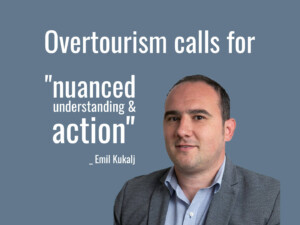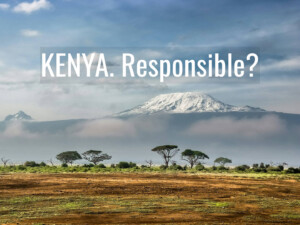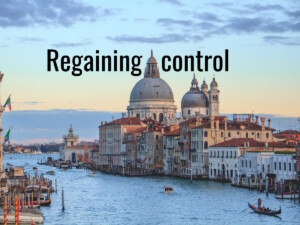Can we manage mass tourism for sustainable, equitable, and progressive outcomes?

If one assumes that mass tourism is unavoidable without an authoritarian crackdown on mobility, what should be done about it?
Kevin Phun suggests that in every challenge lies an opportunity, and proposes how we might manage mass tourism for sustainable, equitable, and progressive outcomes.
It’s a “Good Tourism” Insight. (You too can write a “GT” Insight.)
In less than two hours’ time (as I write this), I will lead a webinar for the Global Sustainable Tourism Council (GSTC) on almost exactly the same topic I am writing about here: exploring innovative strategies for mass tourism; to overcome it, mitigate its most negative effects, and even tap the opportunities it presents.
But are there opportunities?
Contents
Mass tourism: The phenomenon, the issue, and the challenge
Mass tourism is a phenomenon, an issue, and a challenge. It is caused by factors such as cheap flights, better connectivity, greater disposable income for many more people than ever before, tourism policies (or lack thereof), social media trends, and many others.
Mass tourism has been a reality for many global destinations since the late 1970s; much earlier than that for domestic and regional places.
Mass tourism has been discussed and debated countless times over the decades and is much criticised for its contributions to pollution, biodiversity loss, and other environmental issues, as well as to the loss and/or commodification of local cultures and heritage.
Of course mass tourism does generate socioeconomic benefits. However, some argue that those benefits fail to offset the socioeconomic problems it creates, let alone the environmental and cultural ones.
Don’t miss other “GT” content tagged ‘Carrying capacity, mass tourism, and overtourism’
Inevitable mass tourism: Time for a rethink?
Short of banning travel altogether, which very few commentators would argue for, it is evident that mass tourism is not disappearing anytime soon. Indeed many more, not fewer people will be travelling in the future, which means mass tourism’s destructive power will only increase. What can we do about that?
Perhaps it is time to rethink the issue. Rather than engage in a futile fight to end mass tourism, what if we changed our mindset to view mass tourism as a “mass benefit”?
To that end, what if we not only endeavoured to mitigate mass tourism’s negative effects, but also strived to enhance its potential for positive outcomes, recognising that in every direction there are inevitable trade-offs and opportunity costs?
Rather than attempting to tear down what is, what if we asked: How can we harness mass tourism for sustainable, equitable, and progressive outcomes?
Can mass tourism be seen as an opportunity rather than a challenge?
Can mass tourism be seen as a solution rather than a problem?
Maybe a little innovation here and there could help.
Sustainable mass tourism: A contradiction in terms?
Can mass tourism help destinations achieve different sustainability goals?
I would argue that mass tourism offers destinations the chance to identify and tap niche market segments within the broader visitor base that can generate significant attention and resources for specific priorities.
For example, it is human nature to take familiar things for granted. Local people will often take for granted what is fascinating to people from further afield who will pay good money for the experience. The Vietnamese government spearheaded a campaign to leverage food tourism as a means to preserve and valorise the culinary aspects of its cultural heritage.
Iceland, a destination best known for its landscapes and which has “suffered” from mass tourism, has started tapping art and literature enthusiasts among its visitor base to boost its creative industries which otherwise depend upon a tiny domestic market.
Read more by Kevin Phun
There are often areas in a destination that are remote and/or resource-poor for which tourism would be of immense benefit; a fillip to local economies that might otherwise decline further as young people leave to pursue contemporary lifestyles elsewhere.
Vietnam recently started thinking about attracting visitors to interesting but remote villages scattered across the country; Scotland redirects visitors to rural areas through its cycling tourism niche; the Philippines and Taiwan have been marketing agritourism, etc.
Destination managers could target niches from the outset, of course, but it is much easier to do if the destination is already wildly popular for other reasons.
So long as there are appropriate policies and infrastructure in place to manage large volumes of people in transportation hubs and at top attractions then there is immense opportunity for enterprising people, partnerships, and places to innovate.
Manage mass tourism
To conclude, I would assert that how we approach mass tourism does require a rethink. While existential crises force us to look at new ways of doing old things, inevitable circumstances should also force us to be pragmatic in our approach.
So, how can your place, your organisation, your people manage mass mobility and mass curiosity for sustainable, equitable, and progressive outcomes?
What do you think?
Share your own thoughts in a comment below. Can we manage mass tourism for sustainable, equitable, and progressive outcomes?
(SIGN IN or REGISTER first. After signing in you will need to refresh this page to see the comments section.)
Or write a “GT” Insight or “GT” Insight Bite of your own. The “Good Tourism” Blog welcomes diversity of opinion and perspective about travel & tourism, because travel & tourism is everyone’s business.
“GT” doesn’t judge. “GT” publishes. “GT” is where free thought travels.
If you think the tourism media landscape is better with “GT” in it, then please …
About the author

Kevin Phun is a specialist in responsible tourism who combines tourism and sustainable development knowledge and expertise. He is the founder of the Centre for Responsible Tourism Singapore (CRTS) and can be reached at kevin[at]crts.asia.
Featured image (top of post)
Can we manage mass tourism for sustainable, equitable, progressive outcomes? Image generated by Copilot based on the headline of this “Good Tourism” Insight.





